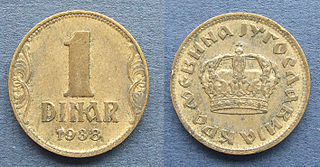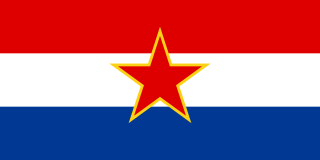
Yugoslavia was a country in Southeast Europe and Central Europe for most of the 20th century. It came into existence after World War I in 1918 under the name of the Kingdom of Serbs, Croats and Slovenes by the merger of the provisional State of Slovenes, Croats and Serbs with the Kingdom of Serbia, and constituted the first union of the South Slavic people as a sovereign state, following centuries in which the region had been part of the Ottoman Empire and Austria-Hungary. Peter I of Serbia was its first sovereign. The kingdom gained international recognition on 13 July 1922 at the Conference of Ambassadors in Paris. The official name of the state was changed to Kingdom of Yugoslavia on 3 October 1929.
Yugoslav or Yugoslavian may refer to:

The Socialist Federal Republic of Yugoslavia, commonly referred to as SFR Yugoslavia or simply as Yugoslavia, was a country in Central and Southeast Europe. It emerged in 1945, following World War II, and lasted until 1992, with the breakup of Yugoslavia occurring as a consequence of the Yugoslav Wars. Spanning an area of 255,804 square kilometres (98,766 sq mi) in the Balkans, Yugoslavia was bordered by the Adriatic Sea and Italy to the west, by Austria and Hungary to the north, by Bulgaria and Romania to the east, and by Albania and Greece to the south. It was a one-party socialist state and federation governed by the League of Communists of Yugoslavia, and had six constituent republics: Bosnia and Herzegovina, Croatia, Macedonia, Montenegro, Serbia, and Slovenia. Within Serbia was the Yugoslav capital city of Belgrade as well as two autonomous Yugoslav provinces: Kosovo and Vojvodina.
Serbian republic or Serb republic may refer to:
The Yugoslav First Federal Football League, was the premier football league in the Kingdom of Yugoslavia (1918–1941) and Socialist Federal Republic of Yugoslavia (1945–1992).

The Yugoslavia national football team represented Yugoslavia in international association football.

Yugo-nostalgia is a political and cultural phenomenon found among the populations of the former Yugoslavia, in the present-day Bosnia and Herzegovina, Croatia, Montenegro, North Macedonia, Serbia, Kosovo, and Slovenia. It refers to an emotional longing for a time past when the splintered states were a part of one country, grief over the war that tore it apart, and a desire to again unite. Self-described "Yugo-nostalgics" may assert their grief that brotherly love, unity, and coexistence failed, while division and nationalism won, or they may assert that their quality of life was better.

The dinar was the currency of the three Yugoslav states: the Kingdom of Yugoslavia, the Socialist Federal Republic of Yugoslavia, and the Federal Republic of Yugoslavia between 1918 and 2003. The dinar was subdivided into 100 para.

The Socialist Republic of Croatia, or SR Croatia, was a constituent republic and federated state of the Socialist Federal Republic of Yugoslavia. By its constitution, modern-day Croatia is its direct continuation.
Serbia is a southeastern European country.
Yugoslav Army, Army of Yugoslavia, or Military of Yugoslavia may refer to:

The Ministry of Foreign Affairs of Yugoslavia was the ministry responsible for representing the Kingdom of Yugoslavia internationally from 1918 to 1941 and the Socialist Federal Republic of Yugoslavia from 1945 to 1992. It may also refer to the ministry which represented Serbia and Montenegro from 1992 to 2006.

Democratic Federal Yugoslavia was a charter member of the United Nations from its establishment in 1945 as the Socialist Federal Republic of Yugoslavia until 1992 during the Yugoslav Wars. During its existence the country played a prominent role in the promotion of multilateralism and narrowing of the Cold War divisions in which various UN bodies were perceived as important vehicles. Yugoslavia was elected a non-permanent member of the United Nations Security Council on multiple occasions in periods between 1950–1951, 1956, 1972–1973, and 1988–1989, which was in total 7 years of Yugoslav membership in the organization. The country was also one of 17 original members of the Special Committee on Decolonization.

The Socialist Federal Republic of Yugoslavia was one of the founding members of the Non-Aligned Movement. Its capital, Belgrade, was the host of the First Summit of the Non-Aligned Movement in early September 1961. The city also hosted the Ninth Summit in September 1989.

Albania–Yugoslavia relations were historical foreign relations between Albania and now broken up Yugoslavia. With occasional periods of friendly relations or efforts to improve relations, the two countries predominantly maintained cold or openly hostile relations. The period of close relations developed right after the end of World War II when Yugoslavia pushed for socioeconomic integration of Albania into Yugoslavia within the Balkan Federation, but they turned into sharp antagonism after the 1948 Tito–Stalin split.
Federated Serbia may refer to:

Switzerland–Yugoslavia relations were historical foreign relations between Switzerland and now broken up Yugoslavia. Switzerland established diplomatic relations with the Yugoslavia in 1919. A Swiss legation was established in Belgrade in 1940, which was upgraded to an embassy in 1957.

Croatia–North Macedonia relations are foreign relations between Croatia and North Macedonia. Two countries established diplomatic relations on 30 March 1992. Croatia is represented in North Macedonia via its Embassy in Skopje and honorary consul in Strumica while North Macedonia is represented in Croatia via its Embassy and the Cultural and Informational Center in Zagreb as well as consulate in Rijeka and honorary consul in Zadar. Croatia supports North Macedonia's European Union membership. Before their independence in early 1990s, both countries were constituent republics of the Socialist Federal Republic of Yugoslavia as the SR Croatia and SR Macedonia respectively. Croatia was one of the first countries in the world to recognize the independence of the country during the period in which Zagreb itself awaited international recognition. During the long-lasting Macedonia naming dispute (1991-2019) and before the signature of the Prespa agreement Croatia was the first country in the world to recognize North Macedonia under its constitutional name of the Republic of Macedonia instead of appellation "the former Yugoslav Republic of Macedonia". Today, both countries are full members of the Council of Europe, and of the NATO. Croatia is an EU member and North Macedonia is an EU candidate. Since 2006 North Macedonia is a member state of the Central European Free Trade Agreement while Croatia was a member of the area between 2003 and 2013. Croatia strongly support North Macedonian accession to the European Union and historically country also supported North Macedonian NATO membership being one of the first countries to ratify the membership protocol. Trade between the two countries reached 221 million euros in 2020.
This page is based on this
Wikipedia article Text is available under the
CC BY-SA 4.0 license; additional terms may apply.
Images, videos and audio are available under their respective licenses.











